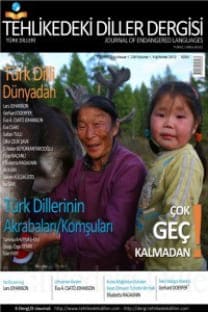ALTAYİK KÖKENDEN FİN-UGORLUĞA MACARİSTAN’DA FARKLI DİLBİLİMSEL YAKLAŞIMLAR
Macaristan’da doğuculuk düşüncesi, Habsburg idaresine bir tepki olarak doğmuş, siyasi, ekonomik ve kültürel anlamda ülkelerine çıkış noktası arayan bazı Macar entelektüelleri tarafından desteklenmiştir. Ancak Macar Türkolojisinin XVIII. yüzyıla dayanan geçmişi dolayısıyla söz konusu fikir, ilmi bir kimlik kazanmış ve adını tarihe Ugor-Türk savaşı denen akademik bir çekişmeyle duyurmuştur. Macar turanizmi Altay milletlerinin kadim kültürlerindeki ortak noktaları aramakta, bunu tarih, dil bilimi ve antropoloji vasıtasıyla gerçekleştirmektedir. Bu anlamda kapsayıcı yapısını korumakla beraber, XX. yüzyılın getirdiği kataklizma nedeniyle politik bir fikir olarak komşu ülkelere karşı tavrı savunmacıdır; millet psikolojisindeki “Avrupa’da yalnızız” sendromu turanizmin bugüne değin Macar toplumunda ve biliminde yaşam alanı bulmasını sağlamıştır. Bu çerçevede alternatif dil teorileri öne sürülmüş ve bu teoriler toplumun belli bir kesiminde kabul görmüştür. Bu çalışmada turanizmin ortaya çıkışı, dil bilimsel tutumu ve Fin-Ugor dil kuramına karşı öne sürdüğü savlar pozitivist ilkeler göz önünde bulundurularak incelenmeye çalışılmıştır. Ayrıca diletantizmin neden olduğu bilgi karmaşası dikkate alınıp, Altayik bir ulus olma düşüncesinin toplumsal algıdaki yerine değinilmiştir.
ALTERNATIVE LINGUISTIC APPROACHES IN HUNGARY FROM ALTAIC ROOTS TO FINNO-UGRIANNESS
In Hungary, idea of eastism arose as a reaction against Habsburg hegemony. It was supported by some Hungarian intellectuals who searched a solution for their country in the field of politics, economy and culture. However, because of Hungarian turcology had a history which extended to XVIII century mentioned idea gained a scientific identification and it announced its name to history by an academic contention which was called Ugric - Turkish War. Hungarian turanism tries to find the common points in the ancient cultures of Altaic nations and accomplishes that with the aid of history, linguistics and anthropology. In this sense it preserves its container components. Nevertheless, because of cataclysm which was brought by XX. century, as a political idea its attitude is defensive against the neighboring countries; by dint of “we are alone in Europe” syndrome in psychology of nation, hitherto turanism has found living space in Hungarian society and science. In this context, alternative language theories were asserted and those theories were accepted by the certain part of the society. By taking into account positivist principles, this study aims to reflect the emerge of turanism, its linguistic attitude and arguments which has been asserted by turanism against the Finn - Ugor language theory. Besides, the study examines its place in social perception of being an Altaic nation by considering information confusion which has occurred owing to dilettantism.
